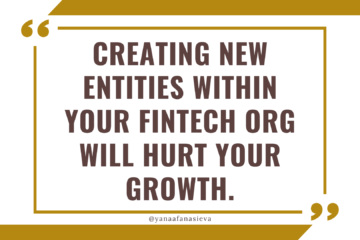FinTech: The Difference Between Saturated vs Sophisticated Markets
A lot of people say that FinTech and payments became an overly saturated market where there are no serious opportunities left and it does not even make sense to start anything new because consumers expect everything for free, regulators impose new costly requirements, and banking partners take forever to make decisions and profitability is hard to find.
At the same time, the barriers to entering FinTech and kicking off your own startup in this space have never been lower because the costs of cloud services, standardized software, offshore development teams, and costs of communications continue to decrease. I have met a number of entrepreneurs with businesses and backgrounds in robotics, real estate, or healthcare who are seriously considering starting their own bank. It sounds naïve, but for outsiders, it may very well feel that running a bank is super easy these days (#nocomments #facepalm). 🤦🏻
Anyway, when you think your market is saturated, it probably means that your customers have a lot of options to choose from and it’s hard to compete.
What does it mean for your go-to-market and pricing strategy when you think your market is saturated?
- You give customers your best stuff, best product, and best experience for free and hope they will eventually upgrade to the premium version or you will later find a way to sell them something else.
- Alternatively (especially in wealth or asset management), you can try and play the “trust and safety” long-term relationship card and promise customers more profits, more opportunities, and better experiences in the future.
However, your strategy can be completely different if you think your market is sophisticated. The difference between a sophisticated and saturated market means that your customers are still not satisfied and have needs and demands that have not been met. They are intelligent, picky, and willing to pay for a service that meets their expectations.
If you believe this is the case, then you are in a diamonds, Apple products, organic foods & Co. business, and it means that in order to sell your services to sophisticated customers, you must win their minds, appeal to their values, be aspirational and ideally shift their thinking or perspective about what becomes possible for them when they use your product or software or service. Choosing you as a service provider or financial partner becomes a lifestyle or value-focused or identity-based decision. Wise and its provocative marketing campaigns did a great job with this during their early days. Lemonade Insurance tried, but I’m not yet convinced. 😉
If you compare this dilemma to the world of consulting services, the biggest frustration many consultants (even BIG 4) have is how to convince the customer that your service is unique, so that the customers don’t make the decision just based on price. If clients see you as a commodity service, they will postpone their decisions and will keep asking for discounts (because they are thinking you are not going anywhere). However, if the client views an opportunity to work with you as a unique 5-star customer experience that is rare and not easily available, they will be willing to sign up for your waitlist. 👏
What’s your opinion – is there an opportunity for a FinTech service to be a lifestyle value-based choice?
I personally cannot name any FinTech that would play in that category, but curious to know what you think! 💭
Don’t ever start your FinTech compliance from scratch – re-use these FREE templates that worked for many other startups!


